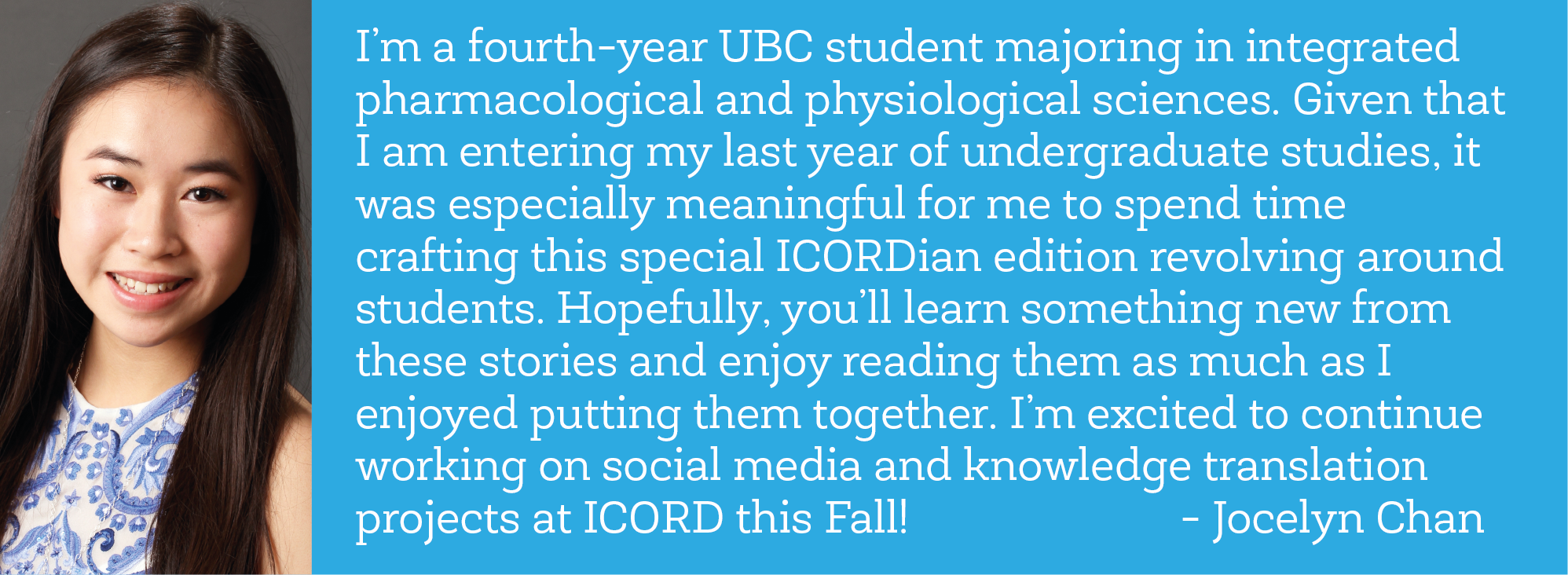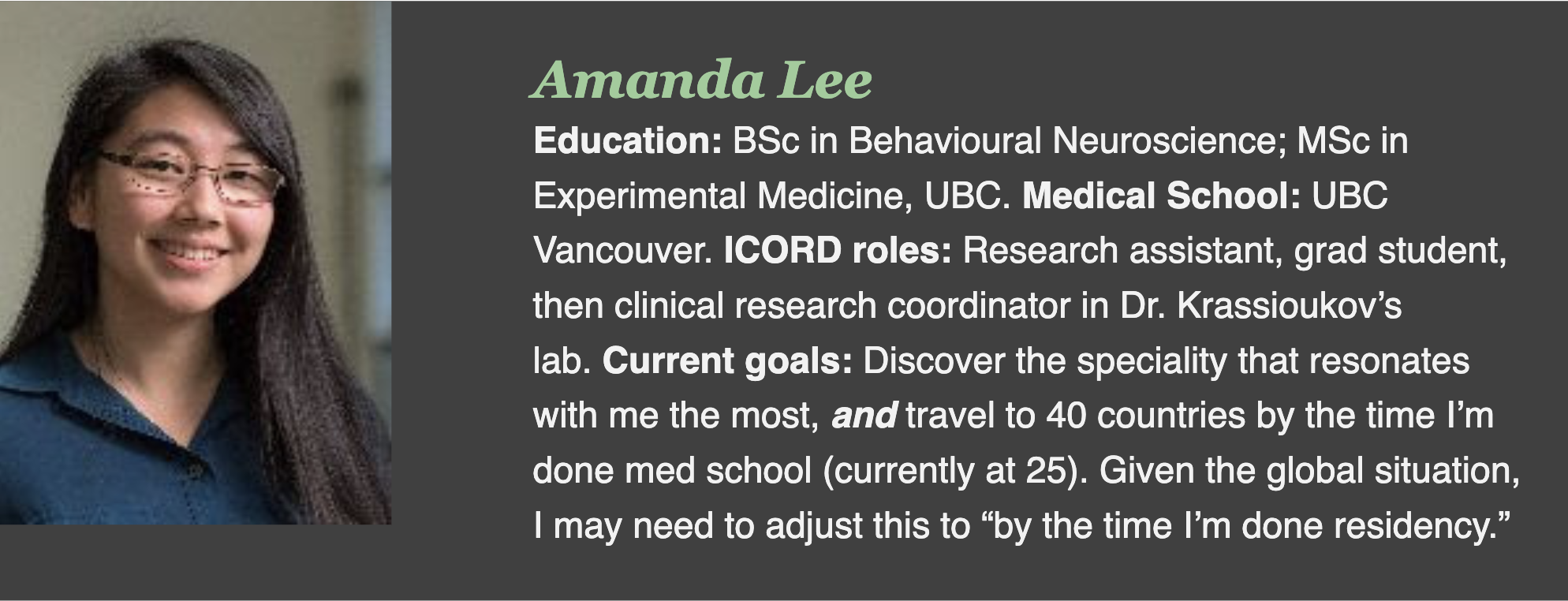
Sep 4, 2020

Our strange Spring blossomed into an equally-strange Summer, and now we’re wondering what Fall has in store for us. Before the leaves start turning, please enjoy this second socially-distant production of the ICORDian community newsletter. In this special back-to-school edition, our guest editors/Work Learn students Rona Herzog and Jocelyn Chan decided to shine the spotlight on the students and trainees of ICORD. All of the articles are about students and/or written by students, along with digital illustrations hand-drawn by SCI Community Resource Centre volunteer Yasi Yaghoub (who is also a student!).
We hope you enjoy these stories:
- Off they go: ICORDians head to medical school
- PhD student develops innovative power wheelchair training
- Teacher-trainees win Killam awards
- Lungpacer helps wean COVID-19 patients from ventilators
- What’s new at ICORD-O – updates from ICORDians at UBC-O
- Help us do research – ICORD studies currently recruiting
- News from our partners – what’s new at SCI BC, Praxis, and VCHRI
By Rona Herzog
We are proud to announce that we have seven fellow ICORDians starting medical school this fall. Given their achievement, we thought it would be fitting for our student issue of the ICORDian to showcase all the students and staff who are going off into this next chapter in their education. Let’s meet them!
We asked these future med students to tell us a bit more about themselves and their paths towards med school. A big question we had was whether the successful ICORDians had always had med school in their sights.
For Alix, it was something she thought about throughout her life, but it wasn’t until she sustained three tibial fractures and underwent three surgeries that she saw the privileged role that physicians play in supporting and guiding individuals throughout challenging and vulnerable times. Alix is most looking forward to applying what she learns in the classroom to interactions with real patients.
Adam didn’t consider going into medicine until his second year of university, when he watched a tv show with a main character who was an underachieving high school student turned physician. That was the spark that made Adam reflect on his past experiences, and set him on his path to medicine. Adam is looking forward to the collaborative curriculum and close-knit community that the faculty has to offer.
Shera was first intrigued by medicine in her undergraduate degree where she had the opportunity to work with Dr. Laura Sly in pediatric immunology research; however, working in research did not allow her to see all of the improvements she was making in medical outcomes and quality of life of patients. This ultimately made it clear that she wanted to transition to the clinical side of medicine, where she can have the opportunity to build relationships with the people she is helping.
Melissa experienced a gradual realization that she wanted to be a doctor that began towards the end of her undergraduate degree. She’s excited about meeting others in the program and the community, as well as having the unique experience of living in different parts of BC through the Northern Medical Program.
After Hattie’s transfer from Science to Kinesiology, she began to do some serious self-reflecting about what her values and passions were, and realized that medicine would allow her to continue doing what she loved, and fulfil her longstanding interest in a career in healthcare and education. Hattie is looking forward to the knowledge and skills she will be learning in this chapter of her life, and is extremely excited to meet new peers and mentors throughout med school.
Amanda’s decision to apply to medical school was heavily influenced by her early days at ICORD, where she gained a better understanding of how SCI affects nearly every organ  system in the body. Amanda knows that many challenges lie ahead, but that those challenges are always an opportunity for personal improvement; she is most excited to use this time to grow as a person and eventually come into her own as a physician.
system in the body. Amanda knows that many challenges lie ahead, but that those challenges are always an opportunity for personal improvement; she is most excited to use this time to grow as a person and eventually come into her own as a physician.
All the future med students said that their experiences at ICORD influenced the success of their applications.
Alix found herself able to stay motivated throughout the application process because she was connecting with and hearing from so many accomplished and dedicated individuals around her.
Adam learned the particular importance of using inclusive language, and was able to experience real-world clinical and discovery research. Also, the reference letter from his supervisor, Cheryl, was definitely helpful (thank you, Cheryl!).
Similar to Adam, Shera felt her experiences of practicing research first-hand, that is already making an impact in the lives of individuals with SCI, added to the success of her application. Shera built meaningful relationships with the members of Dr. Kwon’s incredible team, and can’t wait to collaborate again with them in the future as a physician.
Hattie experienced ICORD as both a volunteer and a supervisor at PARC. This had an enormous impact on her and imparted a newfound appreciation for the uniqueness of the lived human experience, which she thinks definitely contributed to the success of her application. While at PARC, Hattie developed her interpersonal skills and established strong, genuine relationships with a wide variety of people from many different backgrounds. These interpersonal skills will be invaluable as she strives to deliver quality care for people from all walks of life as a healthcare professional.
Amanda praised the supportive atmosphere and unique opportunities for trainees at ICORD, which certainly contributed to her successful application. From collaborative opportunities with the SCI community to mentorship from clinicians and scientists, her experiences profoundly affected her as a person, and reaffirmed her decision to pursue medicine, time and time again.
UBC Med School started on August 24. Best of luck to these aspiring doctors and all their classmates as they navigate this exceptional school year!

By Jocelyn Chan
For her PhD dissertation project, Dr. Emma Smith of ICORD PI Dr. Bill Miller‘s lab evaluated the feasibility of novel powered wheelchair skills development program which uses a technology called CoPILOT to enhance training. CoPILOT is a remote control device that allows a trainer to have shared control of the powered wheelchair with a learner during the training process, much like a second steering wheel and brake in a driver training car. Trainers can use CoPILOT technology to keep learners safe, and assist learners with more difficult skills until they become more proficient doing them independently.
“In typical powered wheelchair training, the trainer needs to stay quite close to the wheelchair to have access to the joystick in case of emergency. This limits what the trainer is able to do with the learner in terms of training activities, and is risky to the trainer,” explained Emma. “Typical powered wheelchair training also involves trial and error approaches, which may not be ideal if the learner has memory difficulties arising from cognitive loss or a brain injury.” With the CoPILOT program, trainers have the opportunity to use more effective training methods, as they have more control over the learning experience.
Early on, trainers use techniques such as demonstration and modeling, which have a very low chance of error. This gives the learner the opportunity to see and feel how the tasks are completed. As the learner progresses in their skills, trainers use techniques which slowly introduce the potential for more error, while still ensuring the learner has successful learning experiences. While error can be useful for learning, particularly for those who have no cognitive impairment, error-minimized approaches have shown promise in teaching skills to people with memory loss.
Can CoPILOT benefit people with SCI? “While not everyone with an SCI experiences memory loss, many people with SCI experience brain injuries associated with an accident or injury, and older adults with SCI may have aging related memory loss,” said Emma. “CoPILOT provides an alternative training approach for those individuals to ensure they are able to use powered wheelchair technology effectively. CoPILOT also allows the learner to have a bit more space and independence in the training experience, which some people may prefer. We are also exploring the potential of CoPILOT use for caregivers, which could expand the number of people who would be able to use powered wheelchairs in the community.”
While the CoPILOT technology is still a prototype, Dr. Smith and her colleagues are working towards commercialization to make it more accessible to anyone who would like to use it. CoPILOT can be implemented anywhere and the system has already been tested in rehabilitation, residential care, and in the community. Dr. Smith hopes CoPILOT will allow more people to be trained to use powered wheelchairs, especially those who might otherwise have difficulty learning.
Watch Emma demonstrate CoPILOT in this short video:

By Jocelyn Chan
ICORD trainees Mahsa Khalili and Masoud Malakoutian have won Killam Graduate Teaching Assistant Awards for their outstanding performance as UBC teaching assistants. Mahsa is a Ph.D. candidate with Drs. Jaimie Borisoff and Machiel Van der Loos, and Masoud is a Ph.D. candidate with Dr. Tom Oxland.

Mahsa earned her B.Sc. and M.Sc. in Mechanical Engineering at the Sharif University of Technology in Iran. After graduating, she worked at a research institute as a design engineer where one of her projects involved designing a lower limb exoskeleton for rehabilitation purposes. This work sparked her interest in biomedical device development and led to her current PhD studies with Dr. Van der loos in the CARIS lab at UBC and Dr. Borisoff at ICORD. Her current research focusses on improving the personal autonomy of wheeled mobility assistive device users. Experience as a shy ESL student gave Mahsa the idea to create anonymous online tools to encourage classroom participation and engage students with many different personalities and backgrounds. “My favorite aspect of being a TA is knowing that I can have a positive impact on students’ learning. That’s one of the most satisfying feelings I have ever experienced!” said Mahsa. The most challenging aspect? “Trying to engage all my students in classroom activities.”
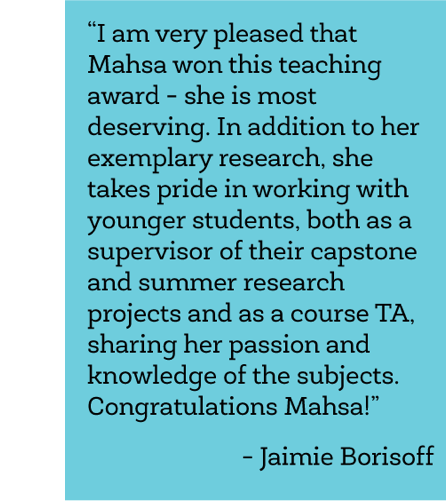 Mahsa strongly believes in the importance of respecting students and understanding their challenges and needs. “In other words, having empathy for all students, as much as possible. I’m always trying to provide equal learning opportunities for all students in class,” she added. Killam GTA recipients are recognized for teaching excellence, but their teaching experience also informs their own research. “Teaching has definitely impacted my perspectives as a researcher. For example, in class we teach students how to approach a problem by breaking it down into smaller steps; I have been practicing the same strategies when working on complex problems. In addition to this, teaching has helped me gain confidence in my knowledge about different topics and my communication skills. This has had significant impacts on my overall confidence about my ability to work and communicate as a researcher,” said Mahsa.
Mahsa strongly believes in the importance of respecting students and understanding their challenges and needs. “In other words, having empathy for all students, as much as possible. I’m always trying to provide equal learning opportunities for all students in class,” she added. Killam GTA recipients are recognized for teaching excellence, but their teaching experience also informs their own research. “Teaching has definitely impacted my perspectives as a researcher. For example, in class we teach students how to approach a problem by breaking it down into smaller steps; I have been practicing the same strategies when working on complex problems. In addition to this, teaching has helped me gain confidence in my knowledge about different topics and my communication skills. This has had significant impacts on my overall confidence about my ability to work and communicate as a researcher,” said Mahsa.
Masoud completed his undergraduate studies in Mechanical Engineering at the University of Tehran, Iran. One of his course projects involved developing an ergonomic and economic school chair for university students. “During that project, I learned about the importance, beauty, and complexity of spine biomechanics and the gaps in that field to be filled,” said Masoud. He applied to do his Masters with Dr. Tom Oxland in ICORD’s Orthopaedics and Injury Biomechanics Group, and is now pursuing his PhD with Dr. Oxland.
As a PhD candidate, Masoud leads the spine muscle project, focusing on paraspinal muscle properties in patients with adult sagittal deformity and those without it. Frustrating experiences in unstructured classes fostered Masoud’s insistence on providing his students with an overview of the materials that will be taught in a session and how those materials fit in the overall course. He takes teaching very seriously: “Each minute in a class of 120 students is worth 120 minutes, so if a teacher makes a mistake that costs one minute of class time, at the very least, they’ve squandered two hours of student time. This makes me feel highly responsible and motivates me to put as much time and energy as I can into preparing for my class. I try to come up with suitable examples and various strategies for explaining my subject. Then, I simulate the class environment and practice the exact material that I will be teaching. This way, during my actual teaching, I have more control over the lesson’s flow and can concentrate on the other aspects of effective teaching, like being attentive, interactive, and energetic.” What does Masoud like best about being a teaching assistant? “Seeing that smile on my students’ faces when they are eventually able to grasp a challenging concept.” The hardest part? “Justice in marking questions with open answers. However, coming up with a proper rubric makes marking much less challenging.”
Masoud recommends that anyone planning to work as a TA attend UBC’s Instructional Skills Workshop. “The invaluable techniques, lessons, and tips I learned through that three-day seminar substantially influenced and strengthened my teaching style.” Like Mahsa, Masoud sees the impact his own teaching experience has had on his PhD studies. “The multidisciplinary nature of my PhD project at ICORD requires extensive communication with surgeons, nurses, engineers, computer/biology/neuroscientists and admin staff. Teaching has equipped me with communication skills and tools which helped to a great extent in addressing logistics and conducting my PhD project,” he said.
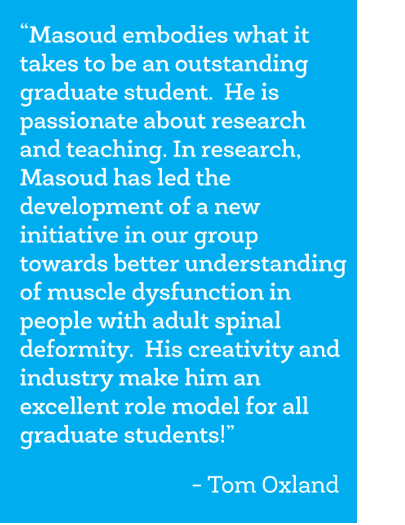 As a PhD candidate, Masoud leads the spine muscle project, focusing on paraspinal muscle properties in patients with adult sagittal deformity and those without it. Frustrating experiences in unstructured classes fostered Masoud’s insistence on providing his students with an overview of the materials that will be taught in a session and how those materials fit in the overall course. He takes teaching very seriously: “Each minute in a class of 120 students is worth 120 minutes, so if a teacher makes a mistake that costs one minute of class time, at the very least, they’ve squandered two hours of student time. This makes me feel highly responsible and motivates me to put as much time and energy as I can into preparing for my class. I try to come up with suitable examples and various strategies for explaining my subject. Then, I simulate the class environment and practice the exact material that I will be teaching. This way, during my actual teaching, I have more control over the lesson’s flow and can concentrate on the other aspects of effective teaching, like being attentive, interactive, and energetic.” What does Masoud like best about being a teaching assistant? “Seeing that smile on my students’ faces when they are eventually able to grasp a challenging concept.” The hardest part? “Justice in marking questions with open answers. However, coming up with a proper rubric makes marking much less challenging.”
As a PhD candidate, Masoud leads the spine muscle project, focusing on paraspinal muscle properties in patients with adult sagittal deformity and those without it. Frustrating experiences in unstructured classes fostered Masoud’s insistence on providing his students with an overview of the materials that will be taught in a session and how those materials fit in the overall course. He takes teaching very seriously: “Each minute in a class of 120 students is worth 120 minutes, so if a teacher makes a mistake that costs one minute of class time, at the very least, they’ve squandered two hours of student time. This makes me feel highly responsible and motivates me to put as much time and energy as I can into preparing for my class. I try to come up with suitable examples and various strategies for explaining my subject. Then, I simulate the class environment and practice the exact material that I will be teaching. This way, during my actual teaching, I have more control over the lesson’s flow and can concentrate on the other aspects of effective teaching, like being attentive, interactive, and energetic.” What does Masoud like best about being a teaching assistant? “Seeing that smile on my students’ faces when they are eventually able to grasp a challenging concept.” The hardest part? “Justice in marking questions with open answers. However, coming up with a proper rubric makes marking much less challenging.”
Masoud recommends that anyone planning to work as a TA attend UBC’s Instructional Skills Workshop. “The invaluable techniques, lessons, and tips I learned through that three-day seminar substantially influenced and strengthened my teaching style.” Like Mahsa, Masoud sees the impact his own teaching experience has had on his PhD studies. “The multidisciplinary nature of my PhD project at ICORD requires extensive communication with surgeons, nurses, engineers, computer/biology/neuroscientists and admin staff. Teaching has equipped me with communication skills and tools which helped to a great extent in addressing logistics and conducting my PhD project,” he said.
 By Jocelyn Chan
By Jocelyn Chan
A device developed by ICORD PI Dr. Andy Hoffer has successfully been used to wean a ventilator-dependent COVID-19 patient.
Lungpacer Medical Inc., an SFU spinoff company founded by Professor Hoffer, is carrying out pivotal clinical trials of a novel th
erapeutic solution for preserving or restoring the integrity and strength of the diaphragm muscle in critically ill patients who require mechanical ventilation.
 On April 14 of this year, the FDA authorized emergency use of the Lungpacer Diaphragm Pacing Therapy System (DPTS) to assist in weaning patients at high risk of weaning failure, including COVID-19 patients requiring ventilation, and patients being mechanically ventilated for other high-risk conditions such as post-cardiac and post-thoracic surgical procedures and medical ICU patients requiring prolonged ventilation.
On April 14 of this year, the FDA authorized emergency use of the Lungpacer Diaphragm Pacing Therapy System (DPTS) to assist in weaning patients at high risk of weaning failure, including COVID-19 patients requiring ventilation, and patients being mechanically ventilated for other high-risk conditions such as post-cardiac and post-thoracic surgical procedures and medical ICU patients requiring prolonged ventilation.
On July 10, the Greifswald University Hospital in Germany announced the first successful treatment of a COVID-19 patient, a woman over 65 years old who survived COVID-19 but had spent 38 days on mechanical ventilation without being able to wean. Restrengthening her diaphragm with the Lungpacer DPTS enabled her to return to independent breathing.
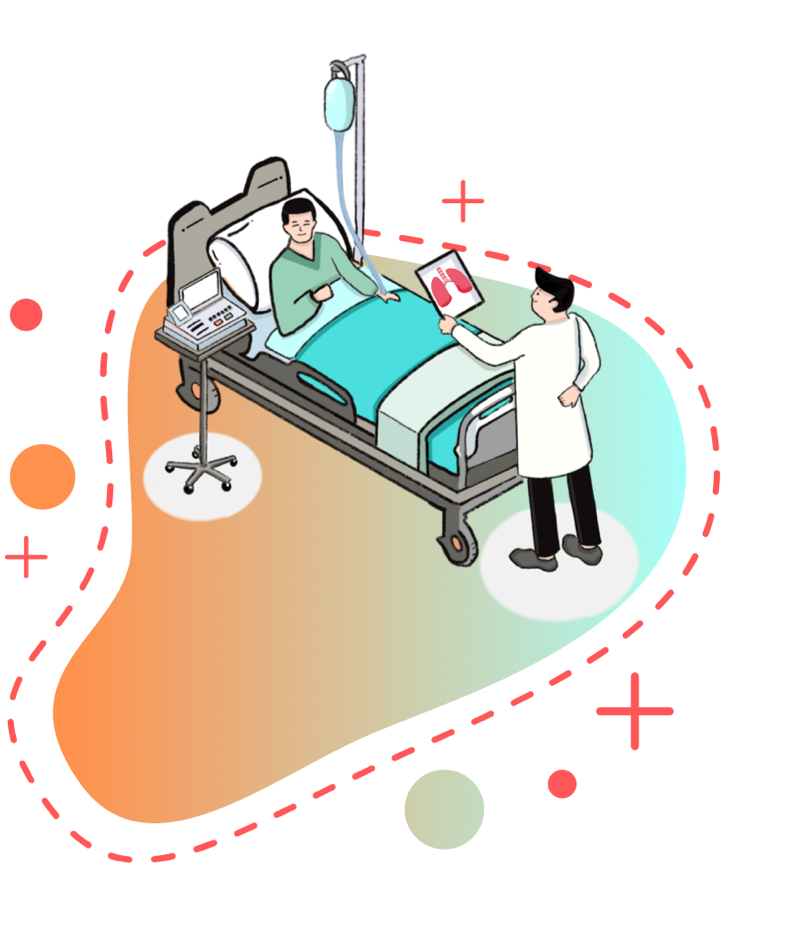
The Lungpacer system is designed to rhythmically activate the diaphragm using a temporary, minimally invasive phrenic nerve stimulation catheter that is intravenously inserted. In critically ill patients who require mechanical ventilation the disused diaphragm muscle rapidly atrophies. In patients who become ventilator-dependent, the pacing therapy is expected to rebuild diaphragm muscle strength and endurance, thus facilitating weaning from the ventilator. In addition, the paced diaphragm restores negative pressure ventilation, thereby providing a more physiological respiratory pattern that reduces the levels of positive pressure ventilation and its harmful effects on the lungs.
Dr. Hoffer hopes that eventually the Lungpacer DPTS will become available for treating ventilator-dependent people with high-cervical SCI who may have partially intact phrenic nerves but are unable to breathe due to diaphragmatic disuse atrophy, in which case the phrenic pacing therapy could be used to rebuild the diaphragm muscle and perhaps enable the return of diaphragmatic breathing.

Some updates by Femke Hoekstra
The Applied Behaviour Change (ABC) Lab, led by Dr. Heather Gainforth, is excited to welcome three new ICORD PhD-students starting September 1:
Kelsey Wuerstl’s research aims to conduct preliminary testing of a theory-based smoking cessation intervention for persons with SCI, using behaviour change theory and an integrated knowledge translation (IKT) approach. In partnership with SCI British Columbia, her research aims to develop a smoking cessation intervention for persons with SCI that can be delivered in the community.
Emily Giroux’s research will focus on the role of community-based organizations in conducting and disseminating SCI research in partnership. With her PhD findings, she hopes to foster capacity in SCI community-based organizations to engage meaningfully with researchers as research partners.
Alanna Shwed’s research will investigate and support the uptake of the IKT Guiding Principles to understand how we can support researchers to implement and maintain quality research partnerships. Her research aims to produce and test an evidence-based resource tool to help researchers to adopt the guiding principles and engage in partnerships that improve the relevance and impact of research findings.

ICORD Trainee Robert Shaw (SCI Action Canada Lab) has won three scholarships: Joseph David Hall Memorial Scholarship, C W Deans Memorial Scholarship and Gragopean Scholarship!
Abstracts submitted by ICORD trainees Gabriel Dix (master student) and Femke Hoekstra (postdoc) from the SCI Action Canada Lab have been selected for a poster award presentation at the International Spinal Cord Society Annual Scientific Meeting (ISCoS 2020). The awarded abstracts can be reviewed here.
![]() Due to the pandemic, ICORD was unable to run our Indigenous Summer Student Program this year, which is especially sad because we were looking forward to expanding our program in partnership with the School of Biomedical Engineering. We hope to be able to continue in the coming year. In the meantime, let’s wish 2019 program alumni Shana George and Dean Harris good luck as they start UBC this Fall. Both students have received prestigious Presidential Scholars awards in recognition of their accomplishments and promise!
Due to the pandemic, ICORD was unable to run our Indigenous Summer Student Program this year, which is especially sad because we were looking forward to expanding our program in partnership with the School of Biomedical Engineering. We hope to be able to continue in the coming year. In the meantime, let’s wish 2019 program alumni Shana George and Dean Harris good luck as they start UBC this Fall. Both students have received prestigious Presidential Scholars awards in recognition of their accomplishments and promise!

Interested in helping ICORD researchers make SCI preventable, livable, and curable? These research studies (and more) are in need of participants!
 SCI research participants’ views on data sharing survey
SCI research participants’ views on data sharing survey
Researchers in Dr. John Kramer’s lab are investigating how individuals with SCI feel about researchers using their data. Specifically, we want to learn how you feel about data sharing. Data sharing is when the data collected in one research study is anonymously shared with others, meaning that a researcher allows others to see and use an individual’s data, after deleting any information that could identify the individual (name/birthdate). As it is your information that would be shared (anonymously), we are very interested to find out your opinions on data sharing.
 Influence of interaction modality on communication patterns of SCI peer mentors
Influence of interaction modality on communication patterns of SCI peer mentors
While research has shown the benefits of peer mentorship, no research has examined how interaction modality impacts the quality of this service. Researchers in Dr. Gainforth’s lab are investigating whether the quality of peer mentorship is impacted depending on how mentors and mentees communicate with one another.
 COPE: Community-health Outcomes and Personalized Education/Exercises for people with SCI
COPE: Community-health Outcomes and Personalized Education/Exercises for people with SCI
Researchers in Dr. Andrei Krassioukov’s lab are investigating the most important needs regarding medical care and rehabilitation services after SCI. This study will also develop web resources for continuing care for individuals with SCI living in the community and their support networks.
 The impact of COVID-19 on people with SCI and rehabilitation access
The impact of COVID-19 on people with SCI and rehabilitation access
Currently there is a limited understanding of the impact of COVID-19 on vulnerable populations, such as the SCI community. In addition, people with SCI may be disproportionately affected by COVID-19 due to pandemic mitigation strategies focused around physical distancing, which interrupts access to caregiver support and rehabilitative services. This Krassioukov Lab study aims to determine the impact of the COVID-19 pandemic on the delivery of rehabilitation services towards people with SCI and their mental health.
 Understanding the experiences of individuals with incomplete spinal cord injury who can walk
Understanding the experiences of individuals with incomplete spinal cord injury who can walk
There is a growing number of individuals who have incomplete spinal cord injury (SCI) who are able to walk. Having an incomplete SCI comes with challenges including living with a potentially hidden disability, and there are questions about the suitability of programs for people with incomplete SCI (which were originally developed for people with complete SCI). Researchers in Dr. Mortenson’s lab want to identify the distinct needs and strengths of people with incomplete SCI who are able to walk, and explore potential supports, services and programs that would best assist this population to adjust, adapt, and thrive in the community.
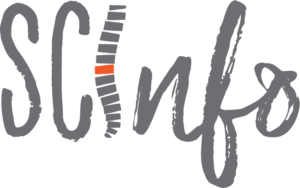 Did you know that volunteers at our SCI Community Resource Centre prepare summaries of scientific papers and post them on our SCInfo blog? If you’re interested in what’s going on in SCI research around the world, this is a good place to look.
Did you know that volunteers at our SCI Community Resource Centre prepare summaries of scientific papers and post them on our SCInfo blog? If you’re interested in what’s going on in SCI research around the world, this is a good place to look.
We are excited to introduce a new series of web comics created by Adam Mesa. What topics would you like to see?


Our new SCI BC Marketplace is now available online! This one-stop hub makes it easy to find accessible housing, employment opportunities or SCI and related physical disability equipment and items. Post, buy, sell or share with others: https://sci-bc.ca/marketplace/
Virtual Peer Support
SCI BC has started a new playlist on our YouTube channel that includes videos from our online Peer Support groups on topics such as mindfulness, nutrition, research, etc. Here’s the playlist.
 RHFAC training courses confirmed for Spring 2020
RHFAC training courses confirmed for Spring 2020
by Hana Cairns, Marketing and Communications Manager, Rick Hansen Foundation
Rick Hansen Foundation Accessibility Certification™ (RHFAC) Training is once again taking place this Spring at post-secondary institutes across the country, including Vancouver Community College. This course teaches individuals how to use the RHFAC methodology to rate buildings on their level of meaningful access. Upon successful completion and passing the subsequent RHFAC Professional exam, individuals can obtain their RHFAC Professional designation, qualifying them to conduct RHFAC ratings within existing buildings and for pre-construction plans.
We are pleased to share that tuition funding is available for persons with disabilities who also meet the prerequisite requirements. For more information, and to see upcoming RHFAC Training courses, visit RickHansen.com/RHFAC or email access@rickhansen.com.

Congratulations to the 2020 Top Doctoral Student and Rising Star Award recipients!
Vancouver Coastal Health Research Institute (VCHRI) is proud to support tomorrow’s research leaders with the Top Graduating Doctoral Student Award and the Rising Star Awards. These awards recognize outstanding efforts by VCHRI research trainees in research excellence, service as role models, and other contributions to the VCH research community.
The 2020 Top Graduating Doctoral Student is Shannon Lim
The 2020 Rising Star award recipients are:
• Gevorg Eginyan (ICORD)
• Evan Gibbard
• Riley Louie
• Jessie McDougall (ICORD)
• Katlyn Richardson (ICORD)
Find out more about the award recipients and their research projects at vchri.ca. Click here to learn about VCHRI’s awards program and funding competitions for researchers, clinicians and trainees.
 Entrepreneurs and innovators: UBC engineering students are making a difference
Entrepreneurs and innovators: UBC engineering students are making a difference
Praxis is fortunate to partner with a number of entrepreneurial biomedical engineering students through its Engineers in Scrubs partnership with UBC. One such student is Alaa Heshmati who designed AccessiBelt, a device aimed at helping people with limited hand function to independently buckle and unbuckle their seatbelt with ease. The device not only makes access to transportation possible for those with grip challenges, but also improves overall quality of life. Click here to learn more about the Engineers in Scrubs program, this innovative device and its designer, Alaa Heshmati.
Designer of the AccessiBelt, Alaa Heshmati. The AccessiBelt is a device that can help people with limited hand function fasten a seatbelt, including those who have experienced a spinal cord injury.

Thanks for reading this issue of The ICORDian – we hope you enjoyed it! Please subscribe and have future issues delivered to your inbox. If you have any comments about this issue or suggestions for future ones, please contact us.





